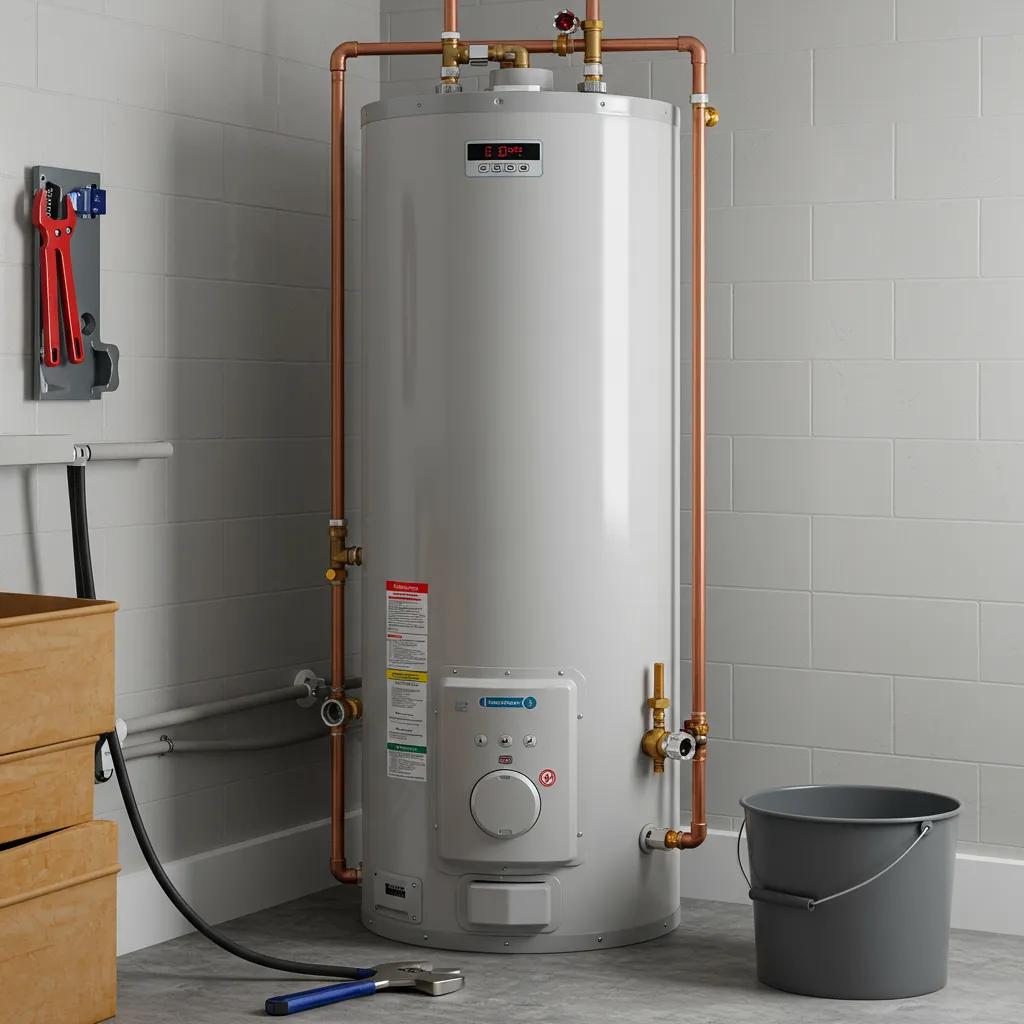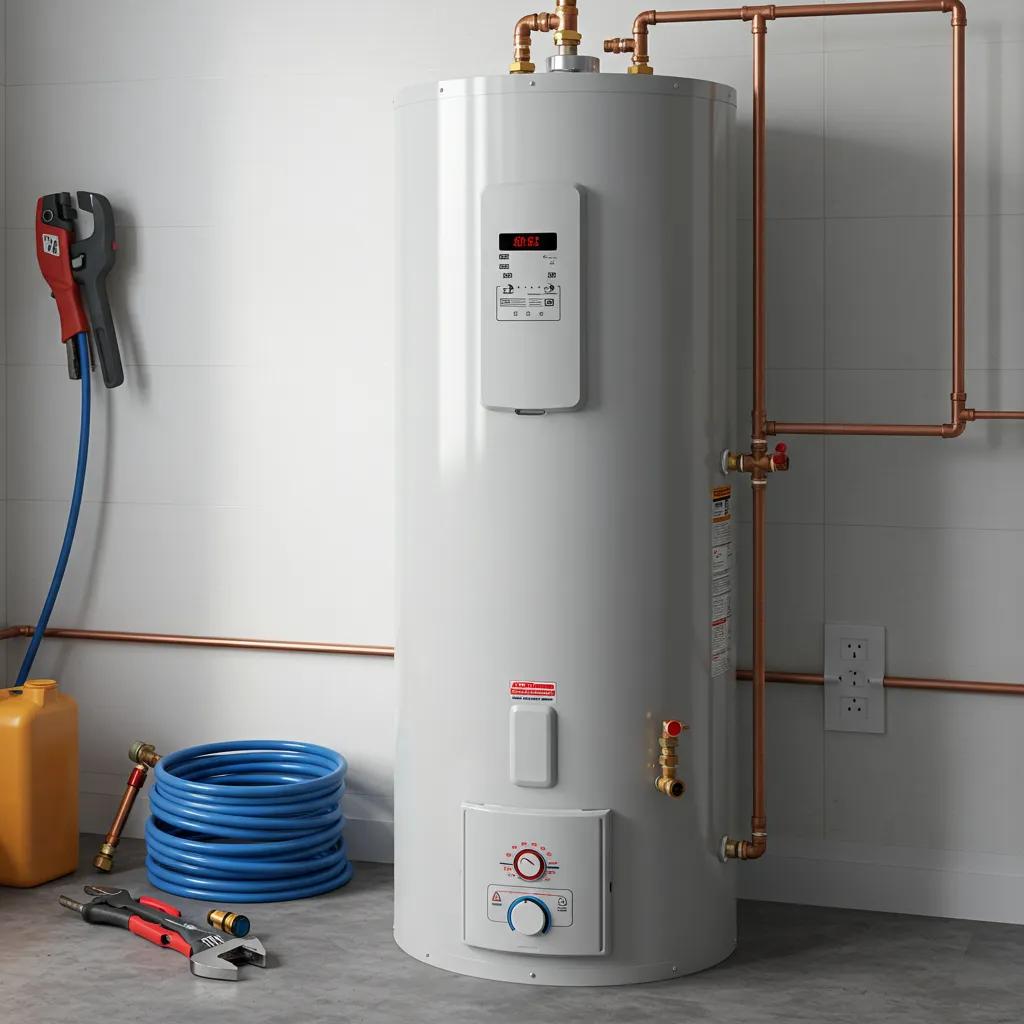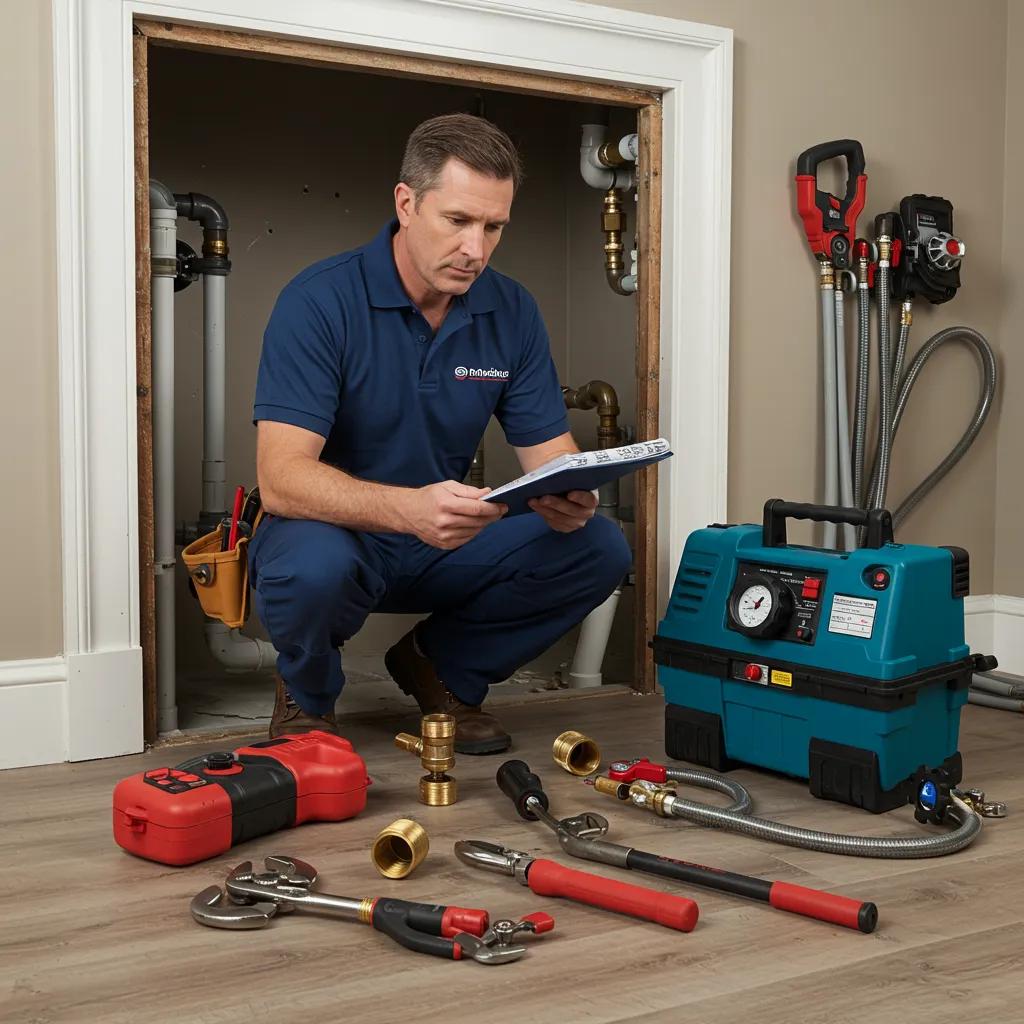How Much Do Plumbing Services Cost? Your Complete Erie, PA Guide to Common Repairs and Fees
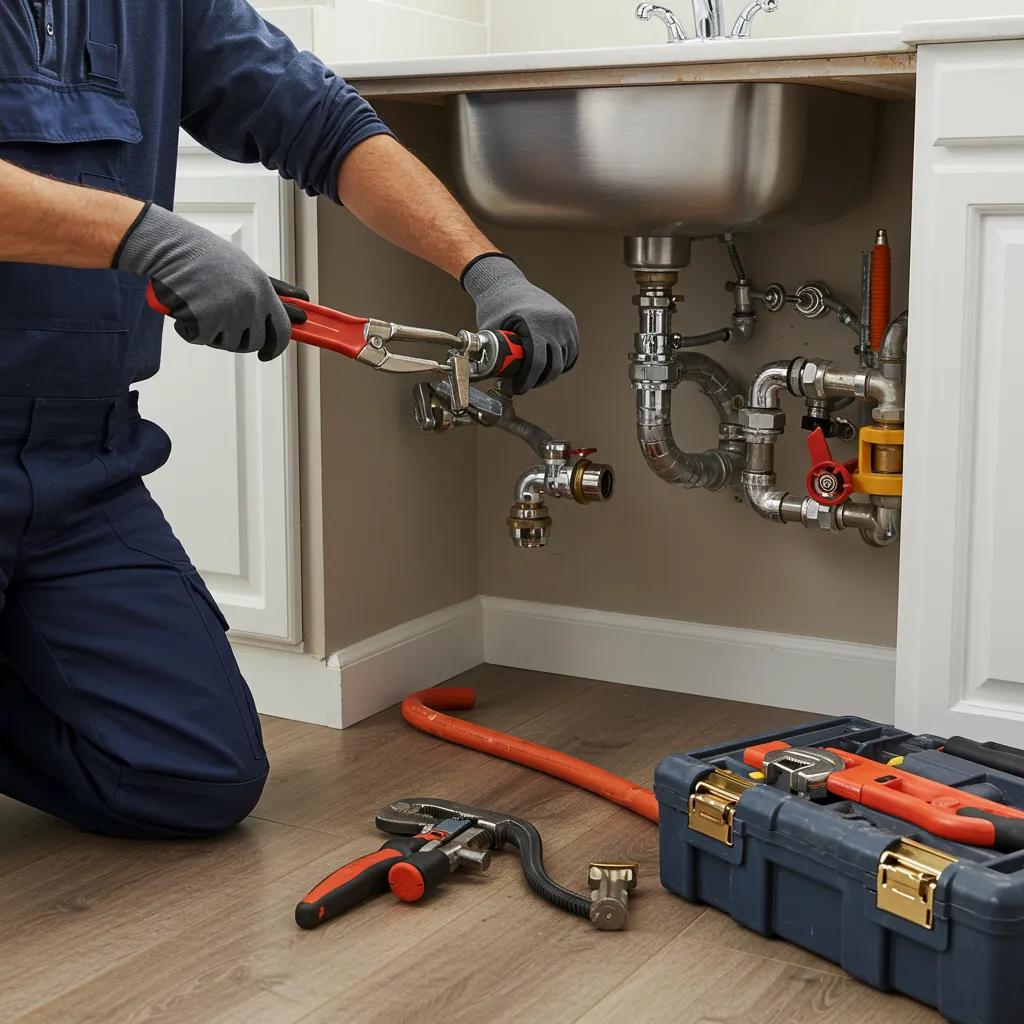
Understanding how much you should expect to pay for common plumbing repairs and services empowers Erie homeowners and business owners to budget accurately, avoid surprises, and secure fair quotes. Transparent cost insights bridge the gap between uncertainty and informed decisions, helping you compare hourly rates, flat fees, and emergency premiums in Erie, PA. This guide explores the key cost drivers—from labor and materials to permit requirements—breaks down average pricing for typical repairs, explains pricing models, contrasts residential and commercial rates, highlights why C. Carlin Plumbing offers unmatched transparency, and shows how to get a precise estimate. By the end, you will have a clear roadmap for navigating plumbing fees, ensuring confidence when you contact C. Carlin Plumbing for a dependable, no-hidden-fees quote.
What Are the Key Factors That Influence Plumbing Service Costs in Erie, PA?
Plumbing service costs reflect a combination of quantitative and qualitative factors that determine the final invoice. Labor rates vary based on technician experience, certification levels, and local market demand, while material quality—from copper piping to premium fixtures—directly affects parts charges. Job complexity, such as hidden leaks behind walls or extensive excavation for sewer repairs, increases time and equipment needs, driving up costs. Emergency or after-hours calls introduce urgency premiums to compensate technicians for immediate response outside normal business hours. Local code requirements and permit fees mandated by Erie County add another layer of expense, ensuring work meets safety and regulatory standards.
Below is a prioritized overview of the primary cost drivers for plumbing services in Erie, PA:
- Labor Rates – Hourly vs. flat-rate models and technician expertise
- Material Quality – Pipe type, fixture grade, specialized parts
- Job Complexity – Leak detection, access requirements, excavation
- Emergency Premiums – After-hours surcharges and urgent response fees
- Permits & Regulations – Local code compliance and permit costs
These factors interact to create a tailored quote for each project, allowing you to anticipate budget ranges before scheduling any service.
How Do Labor Rates Affect Plumbing Repair Prices?
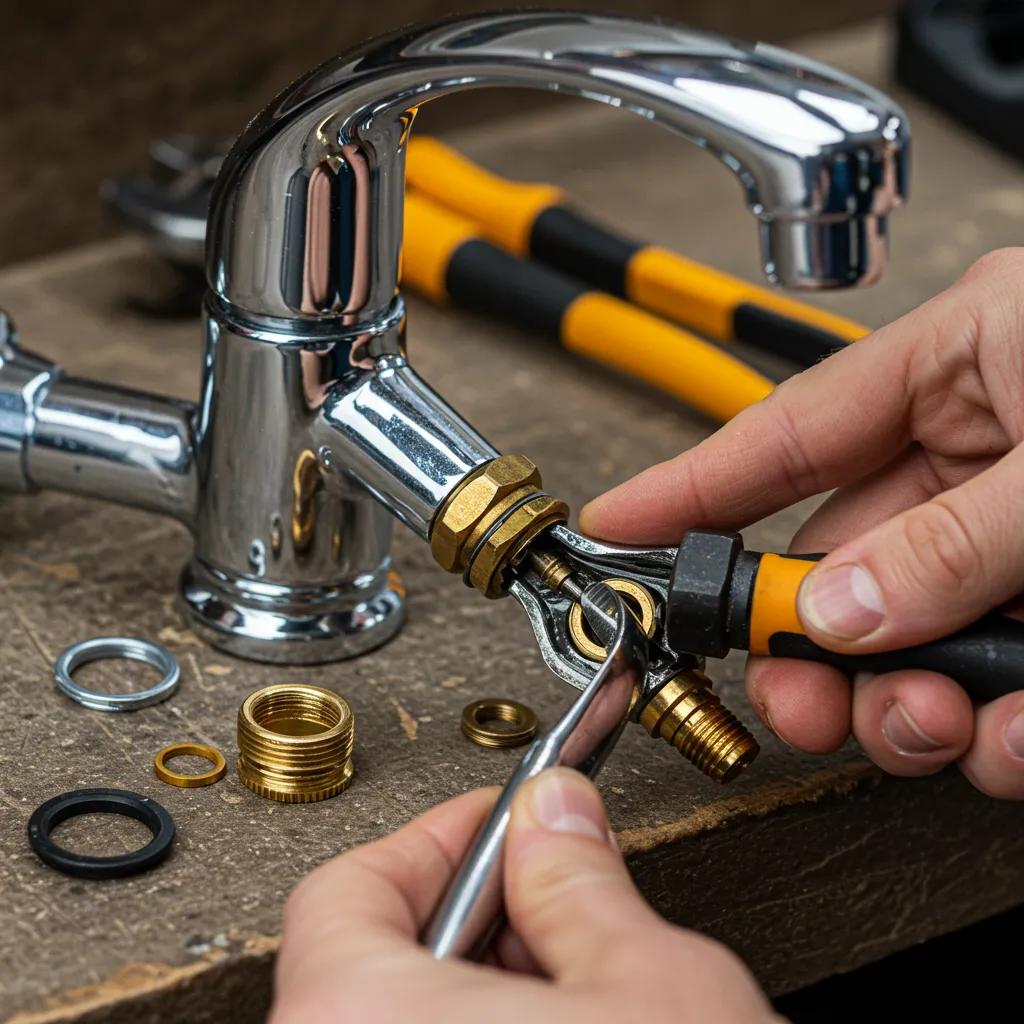
Labor rates in Erie, PA typically range between $63 and $72 per hour for residential plumbing, with commercial projects averaging $88 per hour due to higher complexity and liability. Experienced technicians command premium rates, reflecting specialized training, licensing, and years of hands-on work. Flat-rate pricing applies to standard tasks—like faucet replacement—providing predictable costs without hourly tracking, while complex diagnostics and bespoke installations rely on time-and-materials billing. Understanding how labor contributes to your total expense helps you evaluate quotes: a quicker, skilled technician may lower overall cost by resolving issues efficiently. Tracking both hourly and flat-rate approaches guides you toward transparent, comparable estimates.
What Role Do Material Types and Quality Play in Pricing?
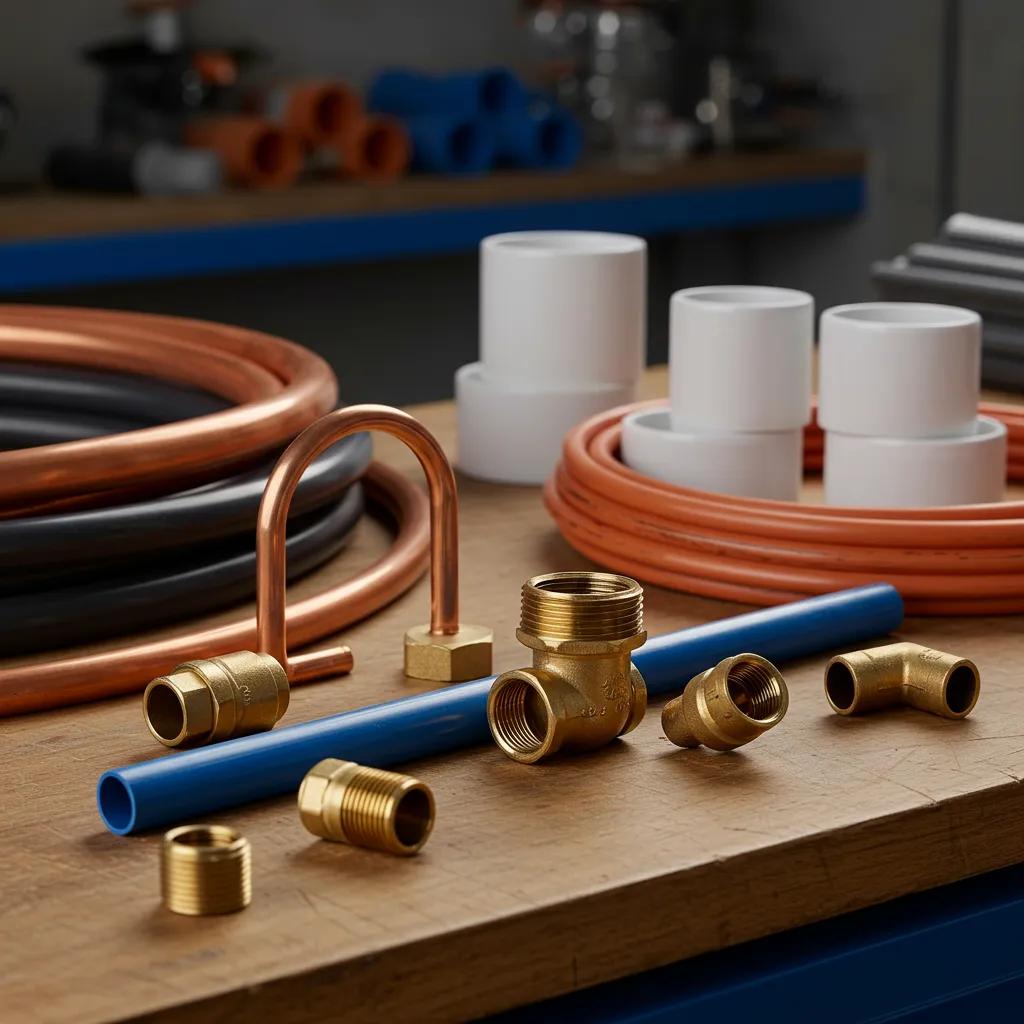
Choosing between copper, PEX, or PVC piping alters both material and labor costs, as each type demands different installation techniques and specialized fittings. Premium fixtures—such as high-efficiency faucets or tankless water heaters—carry higher upfront prices but can reduce long-term maintenance and utility bills. OEM replacement parts often cost more than generic alternatives, but they ensure compatibility and durability, minimizing repeat service visits. When C. Carlin Plumbing recommends specific materials, it balances initial investment against lifecycle value, guiding homeowners toward cost-effective solutions. Material selection thus directly influences the parts invoice and the time technicians spend on each repair or installation.
How Does Job Complexity Change Plumbing Costs?
Simple repairs like clear-out of a sink trap may require minimal time and standard tools, whereas concealed leaks behind walls involve advanced leak detection equipment, wall-cutting, and repair of structural elements. Trenchless sewer methods reduce landscaping disruption but demand specialized machinery and training, reflecting in higher service fees. Projects with multiple simultaneous tasks—like repiping an entire bathroom—benefit from economies of scale yet take longer, blending bulk-rate parts discounts with extended labor charges. Recognizing complexity factors upfront ensures you receive a realistic estimate that incorporates all necessary steps rather than an incomplete, low-ball quote.
Why Are Emergency Plumbing Services More Expensive?
Emergency plumbing invokes immediate dispatch of licensed technicians outside regular business hours, triggering after-hours rates and urgency premiums. Rapid response fees compensate for on-call availability, overtime wages, and expedited resource allocation. Situations like burst pipes or sewage backups require prompt action to mitigate property damage, justifying the cost premium through risk reduction. By understanding these emergency surcharges, you can weigh options—potentially scheduling non-critical issues during standard hours to avoid extra fees—while still having access to 24/7 support when truly urgent repairs arise.
How Do Local Erie, PA Regulations and Permits Affect Pricing?
Erie County mandates permits for many plumbing modifications, with fees set by the municipal building department to ensure code compliance and public safety. Permit procurement involves application charges, plan reviews, and possible inspections, all contributing to project timelines and costs. Licensed contractors include permit fees and administrative time in their estimates, streamlining the process and preventing unexpected regulatory expenses. Factoring these statutory requirements into your budget avoids delays and unanticipated invoices, making regulatory costs a transparent element of your plumbing investment.
What Are the Average Costs for Common Plumbing Repairs in Erie, PA?
Below is a comparative table detailing average repair costs and the primary variables that influence each range in Erie, PA. These estimates reflect 2025 pricing, encompassing parts, labor, and typical regional markups.
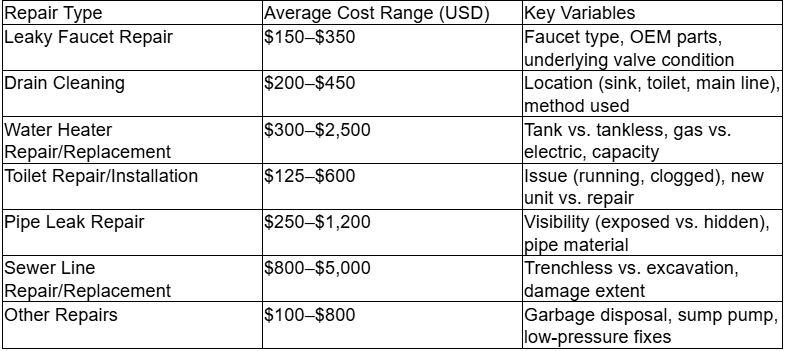
This range guide helps you anticipate costs and discuss project specifics with confidence when contacting C. Carlin Plumbing for a tailored estimate.
How Much Does It Cost to Fix a Leaky Faucet?
Fixing a leaky faucet in Erie generally costs between $150 and $350, depending on faucet style and the complexity of cartridge or valve replacement. Compression faucets often require simple washer changes, while ceramic-disc and ball-type models involve more intricate seals and O-rings. Replacing OEM parts adds reliability but may increase parts expense. Identifying the source of the leak—a worn valve seat versus a cracked cartridge—determines both labor time and parts cost. With transparent estimates from C. Carlin Plumbing, you know whether repair or full fixture replacement best matches your budget and long-term performance goals.
What Is the Typical Price Range for Drain Cleaning Services?
Drain cleaning costs average $200 to $450 in Erie, influenced by the blockage location and clearing method. Kitchen sink clogs often require standard snaking, while main sewer blockages benefit from hydro-jetting to scour pipes thoroughly. Video inspection introduces an additional diagnostic fee but prevents recurring clogs by pinpointing exact obstruction sites. Larger sewer lines and severely compacted roots may increase labor and equipment rental charges. By selecting the most effective clearing technique upfront, C. Carlin Plumbing minimizes repeat service calls and keeps overall drain maintenance costs predictable.
How Much Does Water Heater Repair and Replacement Cost?
Water heater repairs in Erie start around $300 for minor component fixes, rising up to $1,000 for burner or thermostat replacements. Full tank replacements range from $800 to $2,500 based on tank versus tankless technology, fuel type, and capacity. Electric units cost less to install but may carry higher operating expenses over time, while gas units demand venting and combustion safety checks. Tankless installations involve increased labor and specialized gas-line work, reflecting in higher initial fees but yielding long-term energy savings. Transparent pricing from C. Carlin Plumbing clarifies trade-offs so you can choose a solution that aligns with budget and efficiency priorities.
What Are the Costs for Toilet Repair and Installation?
Toilet repair services in Erie typically cost $125 to $250 for running or minor clog fixes, while wax ring replacements average $200 to $350. New toilet installations range from $400 to $600, depending on fixture model and flange condition. High-efficiency or comfort-height models can increase material and labor fees. When existing flanges or drain lines require adjustment, installation costs may rise due to additional plumbing or subfloor repairs. By combining diagnostic accuracy with flat-rate options, C. Carlin Plumbing provides clear choices between repair and replacement that suit your home’s needs and budget.
How Much Does Pipe Leak Repair Usually Cost?
Repairing a leaky pipe in Erie costs between $250 and $1,200, with exposed copper repairs at the lower end and hidden wall leaks requiring drywall removal at the higher end. PEX piping installations often streamline repair and reduce labor time compared to rigid copper, though material costs differ. PVC pipe issues in drain systems may involve joint sealing or section replacement. Assessing pipe access and interior wall conditions helps define the final quote. C. Carlin Plumbing’s licensed technicians evaluate both visible and concealed leaks to deliver accurate, no-surprise pricing.
The location of a leak can significantly impact repair costs, with issues in less accessible areas like basements being less expensive to fix than those on upper floors.
Incidence and Costs of Home Plumbing Corrosion: Leak Repair Cost Factors
The incidence and costs of home plumbing corrosion are associated with the financial costs of pinhole leaks. For example, repair costs of leaks occurring in the basement are much lower compared with repair costs on the second floor.
Incidence and costs of home plumbing corrosion, DJ Bosch, 2008
What Are the Expenses for Sewer Line Repair and Replacement?
Sewer line repairs range from $800 to $2,500 for trenchless patching and root intrusion removal, while full excavation replacements can cost $2,500 to $5,000 or more, reflecting yard restoration and heavier machinery. Damage extent, pipe diameter, and soil conditions dictate the chosen method. Video camera inspections add an upfront diagnostic fee but save costs by targeting repairs precisely. Permitting and disposal of excavated material also factor into the total. With comprehensive sewer services, C. Carlin Plumbing balances minimally invasive techniques with cost-effective outcomes.
What Other Common Repairs Affect Plumbing Costs?
Additional repairs such as garbage disposal replacement ($150–$400), sump pump repair or installation ($200–$800), and low water pressure diagnostics ($100–$350) influence overall plumbing budgets. Each service varies by equipment grade, electrical requirements, and accessibility. Preventative maintenance tasks—like annual sump pump tests or periodic drain flushes—help control long-term costs by reducing emergency interventions. By bundling maintenance upsells with repair work, C. Carlin Plumbing offers cost savings and extends the lifespan of critical systems.
How Do Plumbers Price Their Services? Understanding Hourly Rates, Flat Fees, and Service Call Charges
Plumbers use a mix of pricing models to balance predictability for standard tasks with flexibility for complex diagnostics. Hourly billing covers customized repairs, major renovations, or troubleshooting, ensuring technicians are compensated for each hour on site. Flat-rate fees apply to well-defined services—such as faucet replacements or drain snaking—giving customers a fixed price regardless of time spent. A service call or diagnostic fee covers dispatch, initial inspection, and minor fixes, and it is often credited toward the total cost if work proceeds. Combining these elements helps you compare quotes fairly and choose the model that best suits your project’s scope and urgency.
What Is the Difference Between Hourly and Flat Rate Pricing?
Hourly pricing charges a set rate per technician hour—ideal for unknown, evolving repairs—whereas flat rates offer a prearranged fee for defined services. Hourly rates reflect expertise, allowing technicians to address unforeseen complications without hidden fees, while flat rates simplify budgeting and reduce invoice surprises. For example, a standard faucet replacement under a flat fee might cost $250, but a complex valve assembly discovered mid-job would shift to hourly billing at $70 per hour. Understanding these distinctions enables you to request the most transparent option aligned with your risk tolerance and project clarity.
Do Plumbers Charge a Service Call or Diagnostic Fee?
Yes, most plumbing professionals include a service call or diagnostic fee—typically $75 to $125 in Erie—to cover travel time, on-site evaluation, and basic troubleshooting. If you proceed with recommended repairs, this charge is often deducted from the total labor fees, effectively reducing net cost. The diagnostic visit allows technicians to assess the issue comprehensively, propose cost-effective solutions, and avoid guesswork. By investing this initial fee, you gain clarity on the repair scope, potential parts costs, and expected labor time, ensuring informed decision-making before any work begins.
How Can You Estimate Total Plumbing Repair Costs?
To estimate total costs, sum the diagnostic fee, anticipated labor hours or flat-rate service charge, parts and material expenses, and any permit or disposal fees. Request a written breakdown showing each component—service call, hourly or flat fee, parts cost with markup percentages, permit charges, and emergency surcharges if applicable. Comparing multiple transparent quotes from qualified providers helps validate fair market pricing. You can also factor in preventative maintenance discounts or bundled service offers, which may lower overall expenses. Clear itemization ensures you understand each charge and can budget with confidence.
What Are the Typical Commercial Plumbing Service Costs in Erie, PA?
Commercial plumbing rates reflect larger systems, higher liability, and extended business-grade materials. Labor rates average $88 per hour, with premium fees for after-hours or minimal downtime requirements critical to facility operations. Project scopes—such as grease trap cleaning, backflow prevention, and multi-fixture installations—demand specialized equipment and compliance inspections. Volume discounts on materials may offset some per-unit costs, yet scheduling constraints and framing support needs for larger pipe runs increase labor hours. Transparent commercial estimates outline each aspect, ensuring your business secures uninterrupted service without hidden markups.
How Do Commercial Plumbing Rates Differ from Residential?
Commercial plumbing rates exceed residential by roughly 20–25%, accounting for larger pipe diameters, heavier-duty fixtures, and strict regulatory compliance. Liability insurance premiums for commercial work also raise hourly charges. Projects typically involve permit coordination with multiple agencies, backflow testing, and grease interceptor servicing, none of which apply to standard home repairs. Upfront clarity on these distinctions helps business owners budget accurately and avoid service interruptions.
What Are Common Commercial Plumbing Services and Their Costs?
Grease trap cleaning averages $300 to $600 per trap, depending on capacity and disposal requirements. Backflow prevention device testing and certification range from $150 to $350 annually, with repair or replacement costs starting at $400. Large-scale pipe relining projects may run $30 to $60 per linear foot, and boiler feed line installations range from $1,000 to $3,500 based on complexity. Each service typically includes inspection, cleaning, documentation, and any required municipal reporting, ensuring compliance and uninterrupted operations.
How Can Erie Businesses Get Transparent Commercial Plumbing Estimates?
Erie businesses should provide detailed facility layouts, fixture counts, and usage patterns when requesting quotes. On-site walkthroughs by licensed technicians identify potential code issues, material upgrades, and scheduling preferences that affect pricing. Written proposals listing labor, materials, permit fees, and testing certifications create accountability and simplify comparisons. C. Carlin Plumbing’s commercial quoting process emphasizes clear itemization and open communication, allowing you to approve budgets confidently before work begins.
Why Choose C. Carlin Plumbing for Transparent and Fair Plumbing Pricing in Erie, PA?
C. Carlin Plumbing has built trust in Erie County since 1994 by delivering honest, reliable service and treating every customer like family. Our licensed team brings 150 years of combined experience, continuously trained in the latest plumbing and HVAC technologies. We offer complete plumbing and HVAC solutions under one roof, eliminating coordination hassles and ensuring single-source accountability. With a no-hidden-fees guarantee, fair estimates, and 24/7 emergency availability, we make cost transparency a cornerstone of every project and empower you to make informed decisions.
How Does Local Expertise Benefit Your Plumbing Service Costs?
As a locally operated company, we understand Erie’s seasonal challenges—freezing pipes in winter, high humidity in summer—and tailor solutions to regional conditions. Rapid response times reduce downtime and prevent minor issues from escalating into costly emergencies. Our familiarity with Erie County permitting processes saves you administrative fees and keeps projects on schedule. Local market insights allow us to negotiate favorable material pricing, passing savings to you without compromising quality.
What Experience and Qualifications Does C. Carlin Plumbing Offer?
Our team of licensed and insured technicians averages over a decade of hands-on service each, with specialized certifications in advanced leak detection, trenchless sewer repair, and tankless water heater installations. Continuous training ensures we stay current with code updates and sustainable plumbing solutions like high-efficiency fixtures and water-saving technologies. This depth of expertise minimizes callbacks, enhances system longevity, and justifies our transparent pricing model through reliable, lasting results.
The plumbing occupation involves a wide array of duties, from installing building sewer systems to repairing fixtures, all of which require specialized knowledge and skills.
Analysis of the Plumbing Occupation: Job Duties and Task Statements
The occupational analysis contains a brief job description, presenting for the occupation of plumbing 12 detailed task statements which specify job duties (tools, equipment, materials, objects acted upon, performance knowledge, safety considerations/hazards, decisions, cues, and errors) and learning skills (science, mathematics/number systems, and communications). The 12 task statements cover the following performance duties: installing building sewer, installing building drains and storm sewers, installing and/or maintaining drain waste and vent systems, water supply systems, installing and/or maintaining domestic hot and cold water distribution systems, installing and/or maintaining gas and/or oil systems, installing and/or maintaining hydronic heating systems, installing and/or maintaining fire protection systems, installing and/or maintaining private sewer disposal systems, setting and/or repairing fixtures and fixture trim, and repairing plumbing fixtures and/or fixture trim.
An Analysis of the Plumbing Occupation., 1974
How Does Transparent Pricing Work with No Hidden Fees?
We provide written, itemized estimates that detail labor, parts, permit fees, and any potential surcharges before any work begins. Our flat-rate service options offer predictable costs for common repairs, while hourly rates apply only to custom projects and include diagnostic fees credited toward total charges. Emergency and after-hours premiums are clearly documented, ensuring you know exactly what to expect. This fairness approach builds lasting customer confidence and assures you that the price quoted is the price charged.
What Emergency Plumbing Services Are Available and How Are They Priced?
C. Carlin Plumbing offers 24/7 emergency response for leaks, burst pipes, sewer backups, and critical HVAC failures. Emergency visits incur an urgency premium—typically 25–35% above standard labor rates—to compensate technicians for immediate dispatch outside regular hours. Diagnostic and service fees follow the same transparent structure as scheduled work, with all surcharges disclosed upfront. Rapid mitigation of emergencies minimizes property damage and water waste, ultimately reducing total remediation costs.
How Can You Get an Accurate Plumbing Service Estimate from C. Carlin Plumbing?
Securing a precise estimate begins by providing clear details about your plumbing issue, including fixture type, symptoms, and urgency. Our team asks for any model numbers or visible part information when possible and inquires about prior maintenance history. Virtual photo or video walkthroughs can expedite preliminary quotes, followed by an on-site inspection for final validation. Once details are confirmed, we deliver a written proposal outlining scope, timeline, and itemized costs, giving you full transparency before work begins.
What Information Should You Provide for a Precise Estimate?
To craft a targeted quote, share the type of fixture or system involved, description of the problem, and any attempts at DIY fixes. Note the age and model of water heaters or sump pumps, and indicate visible leak locations or drainage issues. If possible, send photos of the area and any access challenges, such as tight crawl spaces or finished walls. Detailed information prevents scope creep and ensures the estimate aligns with the actual work required.
How Does the Estimate Process Work?
After gathering preliminary details, we schedule a convenient on-site visit where a licensed technician performs a thorough inspection, identifies underlying causes, and confirms material needs. Following the evaluation, we prepare a written estimate that breaks down labor, parts, permit fees, and any applicable surcharges. You review and approve the scope, at which point we schedule the repair or installation with clear timelines and cost expectations.
Are Free Estimates Available for Erie, PA Customers?
C. Carlin Plumbing offers complimentary estimates for most residential and basic commercial plumbing projects. Free quotes cover straightforward repairs like faucet replacements, toilet installations, and drain cleaning. For complex diagnostics requiring specialized equipment—such as sewer camera inspections or advanced leak detection—a modest diagnostic fee may apply, fully credited upon project approval. This flexible approach ensures you receive transparent pricing information with no obligation before deciding to proceed.
What Are the Most Frequently Asked Questions About Plumbing Service Costs in Erie, PA?
Erie customers often want clarity on hourly rates, call-out fees, and whether repair or replacement makes financial sense. Common concerns include the average cost per technician hour, typical service call charges, and how material choices impact total expenses. Business owners ask about volume discounts for large-scale installations, monthly maintenance costs for commercial equipment, and permit fees for code compliance. Understanding these recurring queries helps you prepare questions in advance and secure competitive, no-surprise estimates when you reach out to C. Carlin Plumbing for a personalized service quote.
Recognizing that plumbing budgets fluctuate based on urgency and complexity, many homeowners compare several local providers before choosing. Transparent communication about scope, timeline, and all cost components reduces stress and fosters trust. By addressing the most frequent concerns—such as emergency surcharge rates, flat-rate benefits, and permit fee structures—our team ensures you have the information needed to make informed decisions and avoid unexpected charges.
C. Carlin Plumbing stands ready to answer any additional questions and deliver a clear, itemized estimate for your next plumbing project. Trust our local expertise, comprehensive service offerings, and commitment to transparent pricing to guide you smoothly from quote to completion.

